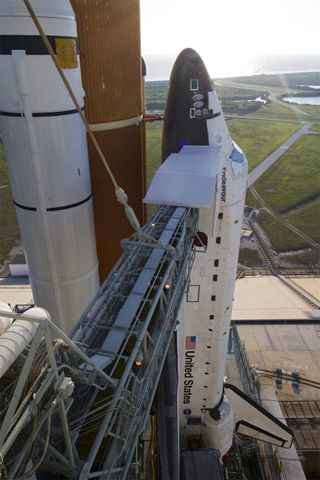Long Government Shutdown Could Delay Space Shuttle Launch

If Congress fails to settle on a national budget by midnight tonight (April 8), forcing a partial shutdown of the United States government, the impact on NASA will reverberate all the way into space. A lengthy shutdown could even delay the next space shuttle launch, which NASA has pegged for April 29.
NASA has posted a detailed plan on how it will respond to any government shutdown, should one occur, on its website, with one clear message: While the agency's nonessential government workers would be on forced furlough, all efforts will made to protect life and property on Earth and in space.
But the workers preparing NASA's space shuttle Endeavour for its final launch on April 29 are not on the list of essential personnel.
"If we have a government shutdown, essentially all shuttle launch processing grinds to a halt," NASA spokesman Allard Beutel told SPACE.com from the agency's Kennedy Space Center in Florida.
Space shuttle snag?
NASA is hoping a shutdown doesn't occur, but the agency does have about nine days of cushion time in its schedule for Endeavour's launch, Beutel said. [What Happens During a Government Shutdown?]
That means that if a government shutdown occurs, but is less than nine days long, NASA could still have Endeavour ready to launch on its final mission to the International Space Station.
Get the Space.com Newsletter
Breaking space news, the latest updates on rocket launches, skywatching events and more!
"We would essentially be running through contingency days," said Stephanie Schierholz, a NASA spokeswoman at the agency's Washington headquarters.
If the shutdown is longer than NASA's schedule cushion, a delay is possible but the space agency would have to re-evaluate its work schedule to see if weekend work could make up for lost time.
A delay may also be prompted by astronaut training needs, since the crew that will fly Endeavour may not be able to practice some tasks as planned during a government shutdown, NASA officials said.
Endeavour's upcoming mission, STS-134, is a 14-day flight to deliver a $2 billion astrophysics experiment to the space station. Four spacewalks are planned. [Photos: Endeavour's Final Mission in Pictures]
The mission is commanded by veteran astronaut Mark Kelly, the husband of wounded Arizona Rep. Gabrielle Giffords, and will mark the final flight of Endeavour before NASA retires its shuttle fleet later this year. Only Endeavour's flight and one other shuttle mission (aboard Atlantis) are planned before the fleet is retired for good.
Some space work would go on
There are, however, some exceptions at NASA to the forced government worker furloughs, should they be required.
The American astronauts on the International Space Station will continue working normally, and will have flight controllers available for support at NASA's Mission Control center in Houston. NASA's modules on the space station will also remain open for business.
"They're considered essential to operations," Schierholz said.
It also means that ongoing robotic missions, like the Mars rover Opportunity on the Red Planet and Cassini probe orbiting Saturn, won't simply shut down. The mission managers for NASA's active science probes across the solar system have been meeting all week to identify essential personnel to keep their spacecraft running.
The senior mission managers are deciding how "to keep the spacecraft or assets safe and make sure they are monitored," NASA spokesman Dwayne Brown told SPACE.com. "And if they are sending data, any data that comes down would just be stored."
You can follow SPACE.com Managing Editor Tariq Malik on Twitter @tariqjmalik. Follow SPACE.com for the latest in space science and exploration news on Twitter @Spacedotcom and on Facebook.
Join our Space Forums to keep talking space on the latest missions, night sky and more! And if you have a news tip, correction or comment, let us know at: community@space.com.

Tariq is the Editor-in-Chief of Space.com and joined the team in 2001, first as an intern and staff writer, and later as an editor. He covers human spaceflight, exploration and space science, as well as skywatching and entertainment. He became Space.com's Managing Editor in 2009 and Editor-in-Chief in 2019. Before joining Space.com, Tariq was a staff reporter for The Los Angeles Times covering education and city beats in La Habra, Fullerton and Huntington Beach. In October 2022, Tariq received the Harry Kolcum Award for excellence in space reporting from the National Space Club Florida Committee. He is also an Eagle Scout (yes, he has the Space Exploration merit badge) and went to Space Camp four times as a kid and a fifth time as an adult. He has journalism degrees from the University of Southern California and New York University. You can find Tariq at Space.com and as the co-host to the This Week In Space podcast with space historian Rod Pyle on the TWiT network. To see his latest project, you can follow Tariq on Twitter @tariqjmalik.
